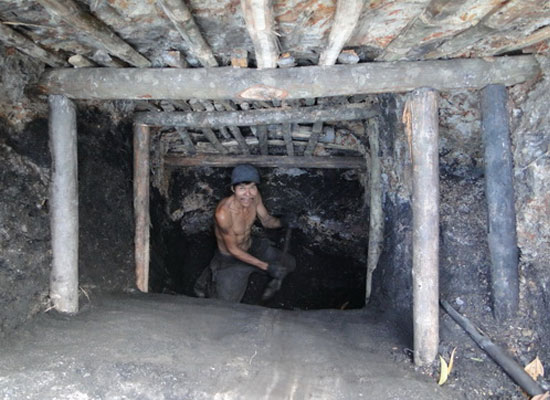How to survive when stuck in a collapsed cellar?
In order to avoid oxygen deprivation, the victim should lower his head to the middle of his legs to increase blood flow to the brain, limiting talking or working hard to avoid losing strength.
>>>The secret of surviving a shipwreck
The collapse of the tunnel at the construction of the hydroelectric Da Dang - Da Chomo, Lam Dong province in the morning of December 16 made 12 workers stuck inside, so far it has not been able to escape. Many doctors fear that the health of the victims will be threatened by lack of oxygen, infection, calcium depletion, or even fainting if they suffer more days.
Dr. Kim Oanh (working in Dong Nai) said that in order to survive in this situation, the victims had to try very hard, most importantly, to keep good spirits, avoid injury or infection. Besides, in order to ensure health, it is necessary to exercise gently and should not operate vigorously.
In order to cope with the severe underground conditions that could be life-threatening, Dr. Oanh has some specific advice as follows:
1. When there is a lack of oxygen
- Should stop all strong activities.
- Bend your head down between your legs. This position will help blood flow to the brain. When you want to move, raise your head slowly, if you feel dizzy, immediately bow your head to the old position between your legs. Repeat like that until you don't feel dizzy. When the dizziness is over, sit still.
- Breathe deeply and slowly. Try not to breathe quickly.
- Limit talking, just shake your head or nod simply to stay healthy.
- Always try to stay mentally alert (except when sleeping). It is best to keep the conversation with yourself.
- Hypoglycemia is one of the causes of dizziness, lack of oxygen in the brain, fainting. So try to eat or drink something, especially sweets.

Lack of air, nutrition is one of the causes of death when trapped in a collapsed cellar.(Artwork: tinmoi)
Deal with hot or cold temperatures
People who are stuck are more likely to be stressed, energy-consuming, causing fatigue and discomfort. If in the dry cellar, it is easy to get hot, and the wet tunnel is easily cold. Therefore, it is necessary to determine the heat and dry or wet state of the tunnel to find suitable hiding places. If possible, drink water in moderation.
3. Always move
The victim should try to maintain the movement of the muscles gently, relax the body, but pay attention to saving energy. People who are trapped in a collapsed cell are usually workers or miners who are accustomed to the intensity of the activity, and suddenly not being mobilized the body will become sluggish, easily hopeless, depressed.
4. Send a leader to the group and do the necessary things
The confusion is easy to arise and spread quickly in the collective when many people are buried in a collapsed cellar. Therefore, appointing a "team leader" is very important. This person will have a way to reassure the whole group and make plans to do the necessary things, from removing some obstacles to cleaning up the small underground habitat. This is very useful for the spirit of the workers, helping the mind of people not trapped underground like their current physical condition.
5. Keep secret
In the early stages, it should not be revealed to the workers stuck in the cell how long they have to wait. Continuously providing safe and positive signals, if possible, send photos of the rescue team who are trying their best to rescue, where they can go, what they have done . That will help The victim temporarily forgets an endless waiting period.
6. Avoid infection
In a tight space that workers suffer, protecting the body from injury and disease must be at the forefront. Maintaining cleanliness is a very difficult task in this situation, but at least the victims need to keep themselves from getting injured or infected. Health needs to be maximized while waiting for rescue.
7. Keep in touch with relatives
Those who are trapped in the horrible collapse will suffer long periods of absence from relatives and fear not to see them again. Connecting with loved ones helps workers have more strength to try to stay abreast.
It should be noted, contacting relatives is not always good. As in the mine collapse in Chile in 2010, contacting a loved one can make it hard for the victim to suffer when the emotion is too intense. On this issue. Dr. James Thompson, a senior professor of psychology at the University of London, advised the following: Relatives on the ground when talking to victims should calm down and talk about positive things. Always constantly updating the rescue process for people who are stuck instead of just crying or showing sentimental sentiment.
- Wine cellar of 3,700 years old
- The world's oldest wine cellar
- Discovered a secret intelligence tunnel from the 16th century in Russia
- Arctic expedition eat each other to survive?
- The cellar contains anti-apocalyptic seeds flooded by melting ice
- How to survive when jumping from a burning building
- The 4 meter long broach stuck in the net
- Revealing the golden
- The dog keeps its shape for 60 years stuck in the trunk
- Discovered a huge mysterious tunnel in the Egyptian pyramid
- Creative ideas save the team stuck in Thailand
- Canada: Race to save whales stuck in ice
 Green tea cleans teeth better than mouthwash?
Green tea cleans teeth better than mouthwash? Death kiss: This is why you should not let anyone kiss your baby's lips
Death kiss: This is why you should not let anyone kiss your baby's lips What is salmonellosis?
What is salmonellosis? Caution should be exercised when using aloe vera through eating and drinking
Caution should be exercised when using aloe vera through eating and drinking